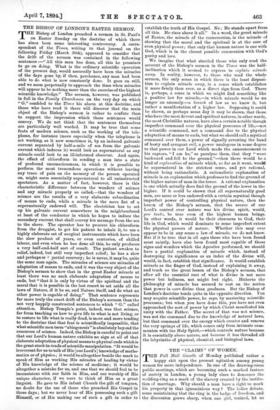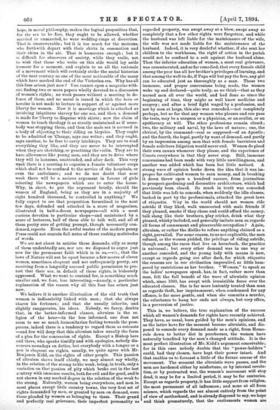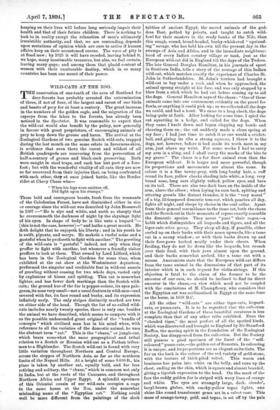THE " CLAIMS " OF WOMEN.
THE Pall Mall Gazette of Monday published rather a happy skit upon the present agitation among young women for more independence. In one of the drawing-room public meetings, which are becoming such a marked feature of society in London, a young lady rises to denounce the wedding-ring as a mark of the slavery created by the institu- tion of marriage. Why should a man have a right to mark his property in that ignominious way ? The ladies debate, some maintaining that the ring is the badge of freedom, and the discussion grows sharp, when one girl, trained, let us hope, in moral philosophy, makes the logical proposition that, for the sex to be free, they ought to be allowed, whether married or unmarried, to wear wedding-rings at discretion. That is unanswerable; but it is too much for the matrons, who forthwith depart with their skirts in commotion and their chins in the air. That is humorous enough ; but it is difficult for observers of society, while they smile, not to wish that those who write on this side would lay aside humour for a moment, and explain to us all the rationale of a movement which will certainly strike the social historian of the next century as one of the most noticeable of the many which have marked the end of the Victorian era. Why has all this fuss arisen just now P You cannot open a magazine with- out finding two or more papers wholly devoted to a discussion of women's rights; no week passes without a meeting in de- fence of them, and no novel is issued in whiCh the hero or heroine is not made to lecture in support of or against more liberty for women. Now it is marriage which is attacked as involving iniquitous slavery for one sex, and then a demand is made for liberty to dispense with skirts ; now the claim of women to teach theology is as stoutly maintained as if some- body was stopping them, and then the male sex is accused in a body of objecting to their riding on bicycles. They ought to be admitted on 'Change, says one writer; and they ought, says another, to be free to carry latchkeys. They are to read everything they like, and they are never to be interrupted when they are sketching, or practising the violin. They are to have allowances like young men, and they are to drive where they will in hansoms, unattended, and after dark. This very week there is a meeting to organise a female volunteer corps which shall not be confined to the service of the hospitals, or even the ambulance; and we do not doubt that next week there will be a serious argument in favour of girls selecting the newspapers which are to enter the house. Why, in short, to put the argument briefly, should the women of England, being as they are in a majority of eight hundred thousand, be controlled in anything ? We fully expect to see that proposition formulised in the next few days, defended and attacked in a score of magazines, illustrated in half-a-dozen newspapers—all with a most curious devotion to particular shops—and maintained by a score of lecturers, half of them able to talk well, and all of them pretty sure of getting prompt, though necessarily con- densed, reports. Even the awful wastes of the modern penny Press could not contain full notes of those rushing multitudes of words.
We are not about to satirise these demands, silly as many of them undoubtedly are, nor are we disposed to argue just now for the permanent faith which is in us,—viz., that the laws of Nature will not be upset because a few scores of clever women, sometimes eloquent and not uufrequently pretty, are receiving from a languidly amused public permission to pro- test that their sex, in default of these rights, is hideously oppressed. What we want to contend for, is something much smaller and, we fear, less interesting,—namely, a particular explanation of the reason why all this fuss has arisen just now.
We believe it is another illustration of the old truth that woman is indissolubly linked with man ; that she always shares his fortunes; and that she usually inherits, and slightly exaggerates, his ideas. . Nobody, we fancy, doubts that, in the better-informed classes, altruism is the re- ligion of the hour—in the less informed, one does not seem to see so much humanitarian feeling towards the pros- perous, indeed there is a tendency to regard them as outcasts —and few will deny that this altruism takes usually the form of a plea for the concession of rights. Except a Bishop here and there, who speaks timidly and with apologies, nobody dis- courses nowadays on duties, but everybody with a tongue or a pen is eloquent on rights, usually, we quite agree with Mr. Benjamin Kidd, on the rights of other people. This passion of altruism shows itself chiefly, we may almost say wholly, in the relation of the strong to the weak, being, in truth, only a variation on that passion of pity which broke out in the last o mtury with immense results, both for evil and for good, and is not shown in any marked degree in the relation of the weak to the strong. Naturally, women being everywhere, and men in most places except little country towns, the very first set of rights demanded by men, or granted by men on demand, were those pleaded by women as belonging to them. Their grand and perfectly real grievance, their imperfect personality as
regarded property, was swept away at a blow, swept away so completely that a few other rights were forgotten, and while the husband was left liable for the maintenance of the wife, the wife was not made liable for the maintenance of the husband. Indeed, it is very doubtful whether, if she sent her children to the workhouse, the right of action in the parish would not be confined to a suit against the husband alone. Then the inferior education of women, a most real grievance, was commiserated, and so far remedied, that every female child among the poor has all her brother's privileges of learning, and that among the well-to-do, if Papa will but pay the fees, any girl can be educated just as thoroughly as a man. Those two immense, and proper concessions being made, the women woke up and declared—quite truly, as we think—that as they nursed men all over the world, and had done so since the beginning of time, they might as well know medicine and surgery; and after a brief fight waged by a profession, and not by men at large, this also was conceded,—not completely perhaps, but so far that any woman who pleases and can pass the tests, may be a surgeon or a physician, or an oculist, or an apothecary at will. The other professions remain closed ; two, the military and naval, by the laws of nature ; one, the clerical, by the command—real or supposed—of an Apostle; and the fourth, the legal, partly by want of demand, and partly by an impression among men that with female barristers and female solicitors litigation would never end. Women do plead their own causes whenever they please, and the experience of Courts everywhere is that they never stop. Still, immense concessions had been made with very little unwillingness, and another was added which has been but little noticed. A strong wave of opinion broke down the idea that it was im- proper for cultivated women to earn money, and in breaking it down threw open a hundred careers, from journalism to prospect-gardening and decorative architecture, which had previously been closed. So much in truth was conceded that little was left to concede, when suddenly the idle classes, backed in part by the professionals, attacked the great laws of etiquette. Why in the world should not women ride astride if they liked, walk unescorted with male friends if they pleased, smoke if they chase and could afford the money, talk slang like their brothers, play cricket, drink what they pleased, whisky included, and generally imitate men as regards all forms of amusement and pleasurable occupation P Again, altruism, or rather the dislike to refuse anything claimed as a right, prevailed. For some reason, to us not explicable, the men refused, or the women yielded, the privilege of riding astride, though among the races that live on horseback, the practice is universal ; but every other demand was in one way or another conceded, and the young lady with means is now, except as regards going out after dark, for which etiquette the reasons are in our civilisation imperative, as little ham- pered by restrictions as her brother. "Woman," to speak as the ladies' newspapers speak, has, in fact, rather more than man, felt the full benefit of the wave of altruistic opinion which, since 1860, has swept with irresistible force over the educated classes. She is far more leniently treated than man as regards theft, her imprisonment, when condemned for any offence, is far more gentle, and when she commits a murder, the reluctance to hang her ends not always, but very often, in a perversion of justice.
This is, we believe, the &tie explanation of the success which all women's demands for rights have recently achieved. They have, as usual, been guided by the men's opinions, and as the latter have for the moment become altruistic, and dis- posed to concede every demand made as a right, from Home- rule down to better diet in poorhouses, the women have naturally benefited by the men's changed attitude. It is the most perfect illustration of Mr. Kidd's argument conceivable; for in this case nobody doubts that the " power-holders " could, had they chosen, have kept their power intact. And that enables us to forecast a little of the future course of the movement. The moment the altruistic wave passes, and the men are hardened either by misfortune, or by internal revolu- tion, or by protracted war, the women's movement will stop dead, it may be for a limited period, it may be for centuries. Except as regards property, it has little support from religion, the most permanent of all influences ; and none at all from science, which regards the sex almost entirely from the point of view of motherhood, and is already disposed to say, we hope and think prematurely, that the excitements women are
heaping on their lives will before long seriously impair their health and that of their future children. There is nothing to look to in reality except the relaxation of men's ultimately irresistible authority, and that, we are contending, depends upon mutations of opinion which are sure to arrive if human affairs keep on their accustomed course. The wave of pity is at flood now ; by 1925 it will have receded, leaving behind it, we hope, many inestimable treasures, but also, we feel certain, leaving many gaps ; and among them that placid content of women with their unalterable destiny, which in so many countries has been one secret of their power.








































 Previous page
Previous page